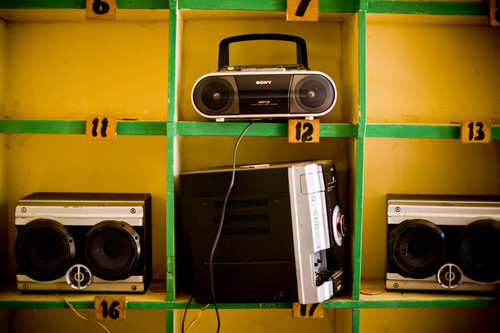
- Planning
- Preparation
- Recording
- Exchange
- Conclusion
Planning
At that point in the syllabus the topic was Festivals. I decided to encourage them to make a radio programme about festivals and special days in Ukraine. We would send the cassette to other schools and hopefully they would send recordings to us, too. The students would work together in pairs to answer questions about various special days and then we would record the interviews.
After the initial language input (topic-based vocabulary and appropriate structures) and practice, we were able to complete the project within a week.
Preparation
Brainstorming
I introduced the idea of the exchange project to the students and told them about the radio programme. Then in pairs they wrote a list of all the days that are celebrated in Ukraine. They then talked about which days they enjoyed most and why. After some discussion, it was clear that students had different preferences, and so it was easy for them to each speak about a different one. Together, they agreed on who would speak about which day.
Pair work
Students began by sharing information with each other about the 2 days they had chosen. If they were unsure about something, other students in the class helped. In fact, all the necessary research was conducted in the classroom. I simply monitored and helped with vocabulary and pronunciation where necessary.
Questions
Since the radio programme would be in the form of an interview, it seemed appropriate to tell students to prepare questions. These questions would form the basis of the interview. Students were encouraged to include some questions based on factual information and some designed to elicit their personal opinions. Then each student prepared 3 or 4 questions which they themselves would like to be asked , and equally importantly, to which they knew the answers. This way, the students could focus on the delivery of the information rather than the content. In pairs, they checked each other's question forms and corrected any mistakes while I monitored.
Rehearsal
Students practised the interview in pairs and then again with another pair. I monitored closely and noted any hindrances to communication e.g. pronunciation problems or misuse of the target language. At the same time I encouraged use of the target language where appropriate.
Recording
Before the class I recorded some traditional Ukrainian folk music onto the cassette to set the tone of a radio programme.
- I set up the cassette recorder in a quiet room to ensure audio quality and clarity. I set the class a task to work on and then took one pair at a time to the quiet room.
- I told the students that we would record 'live' so if they made a mistake they should just carry on.
- I introduced the programme and welcomed the students to the studio and asked them the questions they had prepared.
- Each pair's interview took between 3 and 5 minutes to record so the whole recording took around 30 minutes.
- After the break they listened to themselves and commented on their performance. Later, I recorded some more music onto the end.
In this case, I played the part of the interviewer because the students wanted to work in pairs. However, a student could also do it, especially if you have an odd number of students in the class. The main advantage of my doing it was that I could echo anything which was said that was unclear, for the benefit of the listeners.
Exchange
Unfortunately, we found only one other school to send the recording to and we never received any feedback, which was disappointing. Equally disappointing was the fact that we received no recordings to listen to.
Conclusion
Even though the exchange failed, the task of creating a radio programme benefited the students. They welcomed the opportunity to communicate with non-Ukrainian teenagers and they were keen to share information about special days in their country. Moreover, they were motivated to use the target language and communicate effectively. After hearing the recording, it was clear that they were proud of their achievement, and so was I.
If you would like to find a partner school to do an exchange project with, the British Council's SchoolsOnline can help.
Deborah Bullock, Teacher, British Council, Ukraine